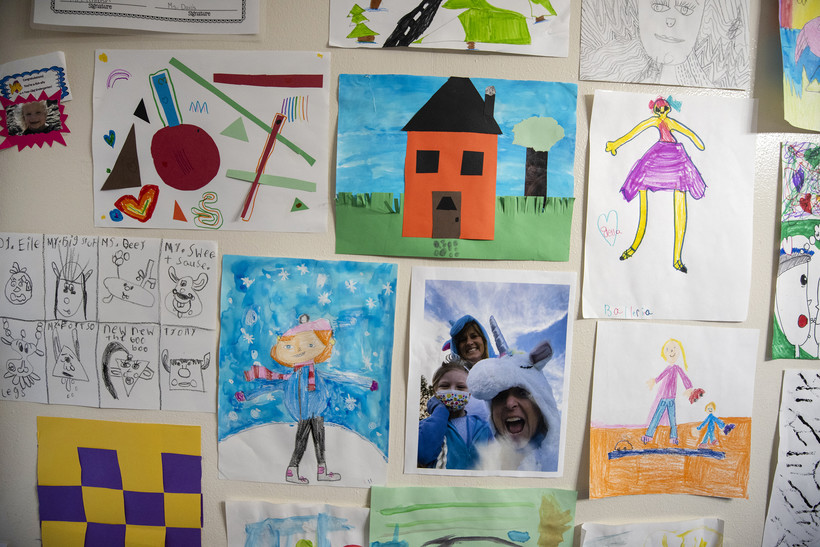State Superintendent Says Public Education Needs More Funding
Superintendent Jill Underly discussed challenges including mental health and racial disparities.

Art that second-grader L.B. created during virtual school is hung on the wall at her home Thursday, March 17, 2022. Angela Major/WPR
In her State of Education Address Thursday, state Superintendent Jill Underly spoke about the challenges facing schools — from students’ mental health to stark racial disparities. But Underly said educators are struggling to tackle those issues because they lack adequate funding.
Public education requires all students to succeed, she said, but Wisconsin isn’t meeting that standard.
“It is our constitutional and community responsibility to eliminate the achievement gap,” Underly said. “But we cannot call it that, we cannot call it an achievement gap, because a gap in outcomes is caused by a gap in inputs. And we can do something about the inputs.”
But in a statement after the speech, Republican Sen. Alberta Darling, chair of the Senate Education Committee, said Wisconsin students’ poor performance stems from Gov. Tony Evers “refusing to reform education in Wisconsin” despite Republican efforts, including a literacy bill Evers vetoed twice.
Darling said Underly is following in his footsteps.
“The DPI Secretary refuses to acknowledge failure,” Darling said. “Under her watch, too many children in our schools are failing. There was not a single acknowledgment that less than one-third of students are proficient in English or Math. Instead of accepting we have the largest achievement gap in the country, she’d rather change the definition.”
Underly, however, outlined ways to improve student achievement and bridge racial disparities. She said policymakers and educators need to recognize that those disparities stem from a gap in representation and engagement, not the student.
That includes increasing representation in curriculum, she said. All students, especially students of color, need to see themselves reflected in what they learn, she said, and not just learn about trauma and struggle, but also growth.
That includes teaching students about the country’s complicated history, Underly said.
“The only way to teach the complete story of the United States is to include the history of racism,” she said. “After all, the founding of this country included both slavery and democracy, and denying the centrality of slavery and racism just because it’s uncomfortable, does nothing but endanger the continuation and strength of our democratic society.”
Educators also need to recognize each students’ needs and meet them where they’re at, instead of leaning on a one-size-fits-all approach, Underly said.
She says one way to do that is by increasing special education resources. Her proposal for the 2023-2025 budget includes $750 million for special education.
Schools increasingly tied up in political turmoil
Schools have become the site of political battles in recent years, with parents, politicians and educators fighting over what to teach in history class and which books to leave on library shelves. LGBTQ+ issues have been the center of many of those arguments, with conservative groups accusing schools of overstepping their authority and indoctrinating students.
On Thursday, Underly said educators need to make schools a safe, affirming space — where all students feel comfortable learning. But in this political environment, Underly said doing that is a challenge.
“Such rhetoric and policies are harmful and dangerous to students’ emotional safety and mental health, but affirming identities through our language and through our policies creates belonging,” she said. “Put more simply, affirming identities suicide prevention. It’s proven self-care. It’s strong mental health practice. Pronouns save lives.”
But to make any of these changes, she said the Legislature needs to bolster funding for public education.
Schools are being asked to do more with fewer resources, she said.
“This austerity that this and previous legislatures have insisted on for our schools is starving our public education system,” she said. “Our schools and children deserve investment. We deserve investment, because investing in public schools is an investment in us, too.”
But in the last budget, she said the Legislature used federal pandemic relief funds as an excuse not to raise education spending.
Investing in schools should be nonpartisan, Underly said.
In 2002, Wisconsin’s per-pupil funding was 11th highest in the country, but it hasn’t kept pace with national growth. In 2020, Wisconsin ranked 25th, spending 6 percent less than the national average.
“We need robust, ongoing, reliable funding for our public schools and libraries across Wisconsin,” Underly said. “Without increased funding, schools and libraries cannot meet the needs of kids — or of all of us.”
Earlier this month, Evers and Underly unveiled a proposal to boost funding for K-12 schools by $2 billion in the next state budget by tapping into that surplus.
The proposal would dedicate money toward supporting students’ mental health, improving financial literacy and cutting school meal costs. It has slim chances of passing the Republican-controlled Legislature, but it underlines Evers and Underly’s priorities.
“The history of public schools in Wisconsin is one of innovation and meaningful and sustained investment,” Underly said. “We do not see that investment today. We must think critically about how that is impacting our children and our state, and we must make a different decision.”
In a statement after the speech, Tim Michels, the Republican candidate for governor, said Underly’s speech “failed to provide Wisconsin taxpayers and families any information on the actual state of education,” calling it a “political stump speech.”
“Tony Evers and Jill Underly are focused on imposing woke politics and gender ideology in the classroom,” Michels said. “We need education that teaches kids how to think — not what to think. Evers and Underly believe pronouns save lives. I believe that literacy and quality education saves lives.”
Listen to the WPR report here.
State superintendent addresses challenges facing public schools and calls on Legislature to boost funding was originally published by Wisconsin Public Radio.





















A DPI estimate that lifting the caps on the voucher program State wide would cost $577,000,000. The Republicans have no problems confiscating tax dollars from public education to finance the religious education of students which families and church communities choose not to pay for. Public education continues to underfunded with having to educate the more difficult students with accountability standards that choice schools can ignore.